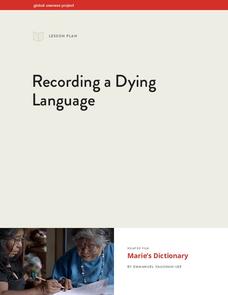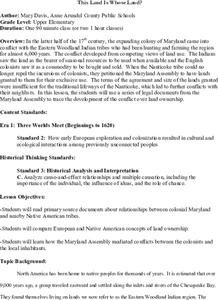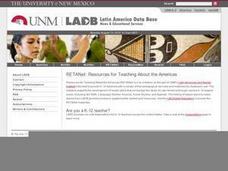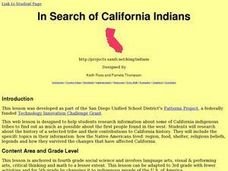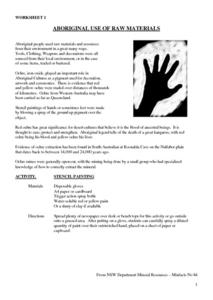Curated OER
People of the Plains:Music and Dance
Fourth graders are given a worksheet stating the goal of the day, different sections to visit, and time spent on each section. They are given the CDs, 4th graders are told to insert the CDs into the computer. Students go to The Plains...
American Documentary
American Aloha: Hula Beyond Hawai'i
In this lesson, high schoolers will examine Hawaii's issues of colonization, authority, authenticity and cultural identity, and understand the distinction between native and non-native Hawaiians. This lesson includes links to videos,...
Global Oneness Project
Recording a Dying Langauge
Is there value in preserving indigenous languages that are almost extinct? That's the question posed to viewers of a short film about the attempt of one Native American woman who is creating a dictionary for Wakchumni, the language of...
K20 LEARN
But What About Me?: Teaching Perspective In The Social Studies Classroom
How would the story of the discovery of America be different if indigenous people told it through their eyes? Individuals compare the conventional account of this moment in history to an account given by one of the native peoples. After...
Curated OER
Australian Aboriginal People: A Fun Introduction
Learners read from a book of poems titled, "Ann the Goanna," and discuss the concept of indigenous people with the teacher. Students answer questions about specific poems read, using a final poem titled, "Reconciliation" to discuss the...
Montana State University
One Mountain, Many Cultures
Americans may think of Mount Everest as a region dedicated to adventurous hikers, but many cultures have flourished there! Learners read informative books, watch videos, participate in classroom discussion, analyze folk tales, and...
Redefining Progress
Have and Have-Not
Is there a correlation between a country's wealth and the extent of its ecological footprint? What exactly constitutes an ecological footprint, and how does one country stack up against the rest? This is a unique lesson to incorporate...
Stanford University
Carlisle Indian Industrial School
How do policies aimed to help actually hurt? Native American boarding schools—an attempt at assimilating children of indigenous tribes into white culture—had a shattering effect on those who attended. With primary sources, including...
Global Oneness Project
The Importance of Indigenous Language Revitalization
Middle schoolers consider languages as representations of cultures and the importance of preserving various languages, especially the rapidly disappearing languages of indigenous peoples, in a lesson that tells the story of Marie Wilcox...
Teaching Tolerance
Thanksgiving Mourning
Two primary sources, a speech, and an article provide tweens and teens with different perspectives of the American Thanksgiving holiday. After analyzing Wamsutta James' suppressed speech and Jacqueline Keeler's article, class members use...
Center for History Education
This Land is Whose Land?
Whose land is it, anyway? Young scholars debate the question using primary sources from a case where Maryland indigenous people petitioned for land rights after they lost their original tribal lands. An included chart helps organize...
Curated OER
Food Contributions
Fourth graders make an alphabet book. In this food contributions lesson students identify foods first harvested by indigenous people. Students use the different foods that are still eaten today that were first harvested by indigenous...
Polar Trec
Touring the Poles
Would you want to vacation in the Arctic or Antarctic regions? Scholars research both regions and produce a travel brochure trying to convince tourists to visit. The project focuses on the geography, climate, flora, fauna, and indigenous...
Curated OER
Voyages in a Bottle
Students uncover the method for easily building a ship in a bottle. Then they fabricate a 3-D model of the ship(s) used on an exploratory sailing voyage and display it in a plastic bottle. Students also draw a map of the world their...
Roy Rosenzweig Center for History and New Media
American Indians and their Environment
People could take a page in ingenuity and survival from the Powhatans. Deer skins became clothes, and the members of the Native American group farmed the rich Virginia soil and hunted in its forests for food. Using images of artifacts...
Curated OER
Facts about Indigenous people Jigsaw
Pupils examine facts which address common myths and misconceptions. They recognize the resulting racism, prejudice and discrimination. Students brainstorm for common myths based on the stereotyping of Indigenous people.
Curated OER
Urbanization in the Amazon Basin: Can Indigenous People Survive?
Students investigate the relationship between economic development and social change of indigenous peoples.
Curated OER
In Search of California Indians
Fourth graders research information about some of California indigenous tribes to find out as much as possible about the first people found in the west. They research about the history of a selected tribe and their contributions to...
Curated OER
California: Land and People
Fourth graders research information about some of California indigenous tribes to find out as much as possible about the first people found in the four regions of California. They research the history of a selected tribe and their...
PBS
What's In a Name?
What is in a name? Eager historians trace the geographical history of places in the United States with Spanish names. Using a worksheet activity, clues, and web research developed in conjunction with the PBS "Latinos in America" series,...
PBS
Extranjeros and Expansion
A three-part lesson gives light to the Unites States expansion from the view of Texans, New Mexicans, and Californians. Through videos and written activities, scholars work collaboratively to research specific individuals and their...
NSW Department Mineral Resources
Aboriginal Use of Raw Materials
What's the difference between base metals and precious metals? Experimenting with natural metals is an interesting way for kids to learn about the world around them. Use a resource that contains over 30 pages of worksheets and...
Global Oneness Project
Highways and Change
What is the cost of change? Roberto Guerra's photo essay "La Carretera: Life and Change Along Peru's Interoceanic Highway" asks viewers to consider the impacts of the 1,600 mile-long highway through Peru and Brazil that connects Pacific...
Curated OER
We Were Here First
Learners explore the legal and historical experience of native peoples living in the United States. They write a letter to their United States senator commenting on the Hawaiian bill using information gathered during their research.




